Call it an omnibus column, a miscellany, a grab bag full of goodies. After a couple of good BookNotes columns that were thematic — books on the arts, a list of Advent devotionals, two posts about memoirs — I’ve got to give a good shout out to about two dozen random, recent books that we just have to let you know we have. A few of these are very, very good —all are worth your consideration. Agree with them all or not, these are worth reading, edifying and enjoyable for educated people. A few I hope to review at greater depth later, but we just have to get the word out now. Glad to help you narrow things down a bit by recommending these.
ALL ARE 20% OFF at our BOOKNOTES SPECIAL. YOU CAN ORDER easily by clicking on the order tab at the end of this column. If you have questions, just click “inquire” and ask away, whatever you want to know. We’re not automated or faceless, so it’ll be real humans writing back. We’d like to think we’re humanizing or reforming the practice of on-line shopping.
Thanks to those who support our business, who buy books, who share the reviews, who help us spread the word about the power of the printed page and our south central Pennsylvanian independent bookstore. Good for you. It’s our joy to serve you.
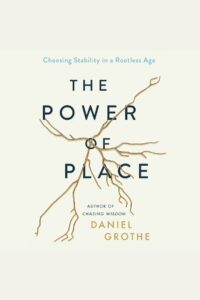 The Power of Place: Choosing Stability in a Rootless Age Daniel Grothe (Thomas Nelson) $25.99 OUR SALE PRICE = $20.79
The Power of Place: Choosing Stability in a Rootless Age Daniel Grothe (Thomas Nelson) $25.99 OUR SALE PRICE = $20.79
This is, I must say, one of my favorite books of the fall and will be one of the Hearts & Minds Best Books of 2021, if and when we get around to making that list. Daniel is a pastor of a large, evangelical church in Colorado Springs and, perhaps surprisingly, was mentored by Eugene Peterson. (His previous book which we exclaimed about, now in paperback, is Chasing Wisdom and it is dedicated to Peterson. And it showed. It was, dare I say, a wise book, and a fun read.)
The Power of Place stand among a very few books on a sense of place written out of a Biblical vision and which inspires ordinary folks. He may be informed by the likes of the high-end Where Mortals Dwell by Craig Bartholomew, or the spirit of Wendell Berry, or the Benedictine notions of stability, but this is so appealing for ordinary readers. It is a wonderful study of place, caring for your locale, staying put. Yes, he draws on quality writes from mystic Thomas Merton to lively, Duke Bible scholar Ellen Davis, but this shows a pastors heart, and, yep, the hands of a small time farmer, living in community with some other stewards of their homestead. This exposes our go-go-go mentality and the “grass-is-greener” attitude that drives us to move on, move up, move away. But Grothe applies the ancient vow of stability to our 21st century, typical American lifestyle and church style, inviting us to say no. Peterson might have said it with a deep growl (even with a twinkle in his eye) but Daniel says it with an upbeat confidence that this really is God’s best life now. With so many of us uprooted and displaced, The Power of Place is a balm.
This book is really, really good.
I love this quote by Rich Villodas, who writes:
Daniel Grothe is one of my favorite pastors. He carries in him a spirit of deep wisdom, helping us pay attention to the reality of God’s presence right where we are. In this much-needed book, Daniel offers a vision of stability for world increasingly marked by distraction, transience, and rootless technological omnipresence. We were made to be present — to God, to each other, and to the rest of creation — and Daneil shows us how to do his through is life and a beautiful exploration of the Scriptures.
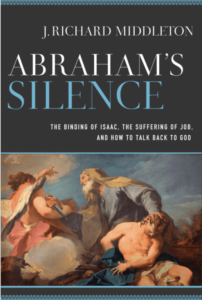 The Suffering of Job, and How to Talk Back to God J. Richard Middleton (Baker Academic) $26.99 OUR SALE PRICE = $21.59
The Suffering of Job, and How to Talk Back to God J. Richard Middleton (Baker Academic) $26.99 OUR SALE PRICE = $21.59
If we give out an award this year for Best Biblical Studies book focusing on the Old Testament, this will win that award hands down. Richard is truly one of our favorite Biblical scholars, and I would say anyone who deeply loves the Word of God should just read anything Richard writes. It’s that good, that informed, that important. It shakes you up. Thanks be to God.
You may know that he co-wrote (with Brian Walsh) two of most important books in my life, The Transforming Vision and Truth Is Stranger Than It Used to Be (that I still recommend, regularly, and lament that not enough people buy them these days.) He has a chapter in our oft-recommended The Advent of Justice devotional. He also has the distinction of writing the two best books (in my opinion, anyway) in two categories: the very best book on what it means to be made in the image of God (The Liberating Image: The Imago Dei in Genesis 1) and the very best serious book on eschatology, A New Heavens and a New Earth: Reclaiming Biblical Eschatology. In both cases, he brings fresh, important insight that is at once deeply faithful and ancient, and yet fresh and utterly contemporary. Those books are worth their weight in gold, packed full of scholarly insight and practical wisdom. For those who work through them, they could be life-changing.
And now, here is this, a stunning study of Genesis 22, a passage that simply has never sat well with me. God is God and we are not, and God can do what God wants. But God has gone out of His way to show us, in Scripture and in the person and teaching of Jesus, what God is like. And the God of the Bible simply doesn’t ask us to kill our children. God does not. Jesus proves it, and to think that God asks Abraham to do this as some kind of test has always been something I’ve been skeptical of. There just has to be another explanation, another interpretation. The standard evangelical sermons, the critical liberal scholarly studies, even their gut-wrenching Kierkegaardian approach leaves me ill-at ease. Into this mess of inadequate interpretations Richard Middleton says what few have said. God expected Abraham to say no.
Holy smokes, could this be the answer? Well — hold on a minute, because one cannot dismiss centuries of nearly uniform consensus of interpretation without good, good reason and without some deeply Biblical reasons. This is going to take some doing, and Richard gives us 250 pages in three major parts. Some is fairly academic, but he livens everything up with lines from movies like The Princess Bride, pop music and the like. Maybe even Burning Spears and Bruce Cockburn…
As the subtitle explains, to get at this daring interpretation, we have to first set aside any qualms about “talking back to God.” In Scripture this is called lament, and in Abraham’s Silence Middleton adds very good Biblical teaching and explanation to the growing body of literature (scholarly articles in his footnotes and popular books, right here on the shelf at Hearts & Minds) saying that lament is a central part of the Biblical witness and a vital part of our own faith formation and a habit of Christian discipleship. (There is nearer the end of the book an amazing chapter called “The Gritty Spirituality of Lament.”) We must sing those Psalms in the Bible, we must cry out, we must protest. The God of the Bible not only can take it, but seems to expect it. God does not want our passive acceptance of suffering and injustice.There are deep reasons for this, and Middleton helps us get at it a bit. We need, as he notes, to understand “the suffering of Job.”
So, after great chapters offering models of Biblical prayer that include “voices from the ragged edge” and invites us to sometimes boldly stand as “God’s loyal opposition” Professor Middleton moves to help us make sense of the equally troubling book of Job. (You know, the one where God plays a deadly, cruel gave with the Satan by killing Job’s loved ones.) Richard’s chapter “The Question of Appropriate Speech” is worth the price of the book. Using the line from Brutus, he asks “Does God Come to Praise Job or Bury Him?” Whoah!
And so, from the question of lament thru the study of Job, we get to this question of “talking back to God.” I hope you get the gist. These serious parts of the book are evocative and generative and transformational, in and of themselves. But you also get to see where this is going — Abraham’s silence is the problem in this Genesis text, called by older Jews as the Aqedah. With help from Jewish friends and centuries of Jewish interpretation (which he seems to know well) Middleton asks how to “unbind the Aqedah” from tradition. (Clever use of words, there, eh, unbinding the text.) I can’t over-simplifying this careful, even dense, study, and it is a joy and blessing to follow his argument, but it starts with this question of whether or not we have misread and misapplied the story of the binding of Isaac and explains that “God desires more than silent obedience in difficult times.”
I am not alone in insisting that this is a magisterial, extraordinary and daring volume.
This is interpretation at its most daring and at its best. Middleton sees the urgency of speaking up to God, a ‘speaking up’ in which God delights (see Job 42:7)! Middleton’s conclusion matters among us now in a time of authoritarian silencing all around us. — Walter Brueggemann, Columbia Theological Seminary, emeritus
This book is an extraordinary commentary on the meaning of the Aqedah (Genesis 22). I consider this to be a masterpiece of once-in-a-generation quality. Abraham’s Silence respectfully reverses millennia of traditions (Jewish and Christian) that praise Abraham’s unquestioning obedience to the instruction to sacrifice Isaac while taking them seriously and honoring them. As a Jew, I deeply appreciate the theological humility with which the whole book is written. The result is a fair-minded, 360-degree scan of all the available wisdom on a theological conundrum that has baffled the wise for centuries. This book deserves to reach the widest possible audience of Bible readers. — Rabbi Irving (Yitz) Greenberg, President, J. J. Greenberg Institute for the Advancement of Jewish Life, Hadar Institute
In this groundbreaking work, Middleton dares to question Abraham’s unquestioning obedience in Genesis 22. His approach is robustly biblical-theological, but his outside-the-box thinking offers an intriguing new solution to two interpretive puzzles: the binding of Isaac and the testing of Job. The pastoral implications of this book make it a must-read for pastors and biblical scholars alike. — Carmen Joy Imes, Biola University
I have been learning from Middleton for over twenty-five years. From him I learned that, in the Bible itself, God invites our questions and doubts. He showed me–through the Psalms and Job–that lament is faithful. This marvelous book exhibits the singular combination that is Richard Middleton: a deep and broad attunement to the Scriptures and a keen philosophical sensibility, both wed to a profoundly pastoral concern. A gift for both church and academy. — James K. A. Smith, Calvin University
Here is an interview with Richard about the book from a special Publisher’s Weekly article released for the AAR-SBL academic meetings this past week. At Richard’s blog he notes one typo — the journalist who interviewed him said he’s been pondering this for six years. It should read thirty-six years!
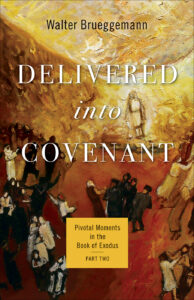 Delivered into Covenant: Pivotal Moments in the Book of Exodus Part Two Walter Brueggemann (Westminster/John Knox) $15.00 OUR SALE PRICE = $12.00
Delivered into Covenant: Pivotal Moments in the Book of Exodus Part Two Walter Brueggemann (Westminster/John Knox) $15.00 OUR SALE PRICE = $12.00
Careful readers of BookNotes might recall our review earlier this year of Part One of this small set, Delivered Out of Empire. We noted with enthusiasm that the two volumes (the second one just out last week) were part of a new, anticipated commentary series that are designed to be brief and useful for Bible study groups. Called “Pivotal Moments in the Old Testament” and under the editorial leadership of Brent Strawn, this ongoing series will hopefully offer more of what these two by Brueggemann on Exodus do. Literally, the reflections examine hinge points, pivotal moments, stuff that happens in the text that (either notably or maybe subtly) change things.
In Delivered into Covenant, Brueggemann offers a guide to the second half of Exodus (from Israel’s journey through the wilderness to Mount Sinai to the establishment of the tabernacle) drawing out the pivotal moments in the text. Throughout, he helps us see how Exodus “consistently reveals a God who is in radical solidarity with the powerless and who is dedicated to cultivating a covenant people who act to repudiate the powers of empire.”
Again, there are questions for reflection or discussion at the end of each chapter (there are fourteen, although the previous volume, Delivered Out of Empire, only has ten chapters) making it great for a small home group, a Zoom Bible study, or an adult Sunday school class.
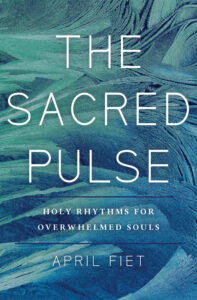 The Sacred Pulse: Holy Rhythms for Overwhelmed Souls April Fiet (Broadleaf) $17.99 OUR SALE PRICE = $14.39
The Sacred Pulse: Holy Rhythms for Overwhelmed Souls April Fiet (Broadleaf) $17.99 OUR SALE PRICE = $14.39
This is a brand new book from the recent Broadleaf imprint, a publisher releasing very interesting and nicely done titles. As it says on the back cover, Fiet here is offering insight into how “in a world of hustle and bravado, silencing the noise takes practice.” For those feeling “frazzled, overwhelmed, and out of sorts” from our contemporary life, this book might help us
“examine the frantic pattern of perfection and production” so we might “reclaim deeper, sacred pulses.” Actually, she lays out twelve practices to help us do that. She says they are “sustainable and sustaining.” Who doesn’t want a more joyful and holy sense of things, a rhyme, even?
April Fiet is a pastor, writer, and blogger, She co-pastors First Presbyterian Church in Scottsblurff Nebraska and is on the editorial board of In All Things. She is a graduate of Western Seminary and has written in places like The Reformed Journal. And she has chickens, so what’s not to love?
Here are others suggesting this book to you.
April Fiet welcomes readers into a space that is both contemplative and practical. The book draws on a wealth of spiritual insight to help readers retreat from the busyness of life and recenter their lives around rhythms that heal, restore, and sustain. — Kristin Kobes DuMez, New York Times bestselling author of Jesus and John Wayne
I felt seen by this book, in a way that was uncomfortable at first. The unsettling insight into my frenetic performance for God was the opening I needed to hear April Fiet’s invitation: to learn to dance with God again, finding rhythms that are, paradoxically, like rest in motion. —James K. A. Smith, author of You Are What You Love and On the Road with Saint Augustine
Filled with clever observations and thoughtful ideas both large and small, this book is a wonderful companion for those of us who want to reorient ourselves to healthy Kingdom rhythms, but are unsure of where to start. — Chandra Crane, author of Mixed Blessing and National Mixed Ministry Coordinator for InterVarsity Christian Fellowship
April Fiet shows us how to find our way to wholeness through intention, community, creativity, and a life-giving embrace of sacred time. The rhythm of this book can be heard as a joyous dance to which we are all invited. — Sophfronia Scott, author of The Seeker and the Monk: Everyday Conversations with Thomas Merton
We have plenty of books on methods, but April Fiet shows how to grow in your awareness of the sacred in the simple, unexpected areas of your life. — Ed Cyzewski, author of Reconnect and Flee, Be Silent, Pray
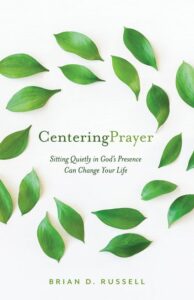 Centering Prayer: Sitting Quietly in God’s Presence Can Change Your Life Brian D. Russell (Paraclete Press) $17.99 OUR SALE PRICE = $14.39
Centering Prayer: Sitting Quietly in God’s Presence Can Change Your Life Brian D. Russell (Paraclete Press) $17.99 OUR SALE PRICE = $14.39
If the above title was an invitation to a whole life spirituality, a “dance” as one reviewer put it, and about including in our lives habitual practices that feel like rhythms, this new one is part of that, a component, if you will, but a vital one. It is about sitting in quiet, about Christian meditation, about silence and the tradition of “centering” prayer.
Much has been written about this mystical form of silent praying, and there are masters in it. Many are Catholic monks or folks with unique gifts and callings to explore this process of centering and mindfulness. This Brian Russell book is, I think, a bit different than most with the “centering prayer” phrase on the cover, in part because it is not overly mystical or esoteric. It is written by an evangelical, a United Methodist pastor who also teaches Biblical studies (and has earned awards as a beloved, respected prof) at Asbury Theological Seminary. His specializes in this deeper sort of spirituality and calls his coaching and direction ministry “Deep Dive Spirituality.” Yes, he stands on the shoulders of the likes of Basil Pennington and Thomas Keating and Cynthia Bourgeault. He cites Richard Rohr. But, like them, he also quotes the patristics and medieval scholars in a way that seems normal. He invites us to pray in ways the older saints understood, drawing on Julian of Norwich and Roberta Bondi’s nice books on the church fathers. And then he applies it nicely for our modern lives.
Despite the deep roots and mystical colleagues, this really is centering prayer demystified. It would be, I think, I perfect follow up to Ruth Haley Barton’s Invitation to Solitude and SIlence, a routine seller for us here at Hearts & Minds. Centering PrayerL Sitting Quietly… has great endorsements from the likes of Dr. Winfield Bevins, A.J. Swaboda, and the Director of the School of Kingdom Living at Dallas Willard Ministries, John Carroll. Even the always energetic Leonard Sweet suggests that “this book could change your life.”
When Brian Russell discovered centering prayer, he reports, he became calmer, less reactive, freed of past wounds and became a better listener. This is a helpful book, then, that can bear good, practical fruit. It is clear as can be. But more than helping us calm down and find peace and healing relationships, it helps us “discover the depth’s of God’s love.” If this book can help with that, maybe it can change us for the better, in the very best way. Highly recommended.
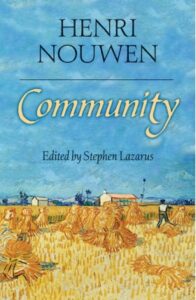 Community Henri Nouwen (Orbis Press) $25.00 OUR SALE PRICE = $20.00
Community Henri Nouwen (Orbis Press) $25.00 OUR SALE PRICE = $20.00
Wow, you read that right — a new book by Henri Nouwen. And compiled and lovingly edited by our friend Stephen Lazarus. (Stephen used to work for the Center for Public Justice (CPJ) in Washington DC and now lives in Toronto, serving as Director for Research and Special Projects act the Henri Nouwen Society.) This book draws together transcripts of talks and messages that have never been published before, together with excerpts of books and articles (again, some that have not been widely seen.) Together, with this new material and nicely woven together previously published content, we have what surely can her called a new book. Even if all of it was previously widely known, pulling his stuff on community together would be a service and make a lovely book. That some of this is from notes from retreats and transcripts of public addresses that have never been published makes this truly an extraordinary publication. What a gift to the world and how very needed it is now.
The good forward is by the senior editor at Orbis, Robert Ellsberg (who knew Henri, not to mention many colorful characters of the last half a century, from Dorothy Day on.) He tells of first trying to get Henri to submit articles for the Catholic Worker, the famous paper founded by Dorothy that he was editing at the time. It’s a good story, and one of those early pieces is chapter four of this new book. The longer introduction is by Stephen and it soars. What a lovely introduction to this longing for community in are lonelier age and what a great introduction to this core theme of so much of Nouwen’s body of work, written and lived.
For many of us, it is hard to believe that this past year marked the 25th anniversary of Henri Nouwen’s journey to Daybreak, his final return to the loving Father. How sad we were upon hearing about his death in Holland, on the way to film a talk in front of the famous Rembrandt painting(“Return of the Prodigal Son”) that graced the cover of one of his most popular books.
But his life and ministry live on, especially in L’Arche communities that continue with wounded healers of all kinds sharing life with the mentally and physically disabled. (One of Nouwen’s last full books was Adam, which told the story of a person he came to know at the Daybreak L’Arch.) Deep community, in other words, is one of the great legacies of the spirituality of Henri Nouwen.
Community, edited by Stephen Lazarus, has 10 solid chapters, in about 140 pages. Very, very nicely done, and a great grace for us all. I don’t want to seem pushy or crass, but you know, this really would make a lovely gift to somebody you know who loves Nouwen. Lots of people have many of his books and would be thrilled to hear about a new collection like this. It is an urgent topic, compiled with great love and care.
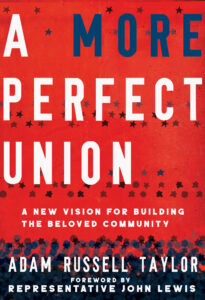 A More Perfect Union: A New Vision for Building the Beloved Community Adam Russell Taylor (Broadleaf Books) $26.99 OUR SALE PRICE = $21.59
A More Perfect Union: A New Vision for Building the Beloved Community Adam Russell Taylor (Broadleaf Books) $26.99 OUR SALE PRICE = $21.59
We have been siting on a big stack of these for a while and I’ve been eager to tell you about it. With other themes and topics, I’ve just to found the right time, but we do want it to be known that we are eager to promote this, sharing far and wide about why it is important to read, to discuss, to debate, to apply. It is a bold and “actionable” call to unite our fractured country (on one hand) but to do so by invoking the things we should all care about. By exploring deep and profound matters of public morality that include caring for the hurting, the lost and the least, as they say. It is a deep social vision of empowerment of the poor by evoking old Judeo-Christian values of justice and care. Yep, it is a mighty reiver flowing down from a modern day Amos, so, despite the call to unity, this is a not another gracious call to civility. This is, as the subtitle puts it, a call to build a beloved community.
Who coined that term, so loved by Martin Luther King, Jr? What is behind it? What does it demand of us? Rev. Adam Taylor has worked on this stuff for decades — although he is now the new president of Sojourners, an ecumenical Christian organization that works to advance justice and peace, he previously led the Faith Initiative at the World Bank Group, served as Vice President of Advocacy at World Vision, was cofounder and executive director of Global Justice, and was selected as a White House Fellow under the Obama administration. A graduate of the Harvard University Kennedy School of Government,
He also graduated from the Samuel DeWitt Proctor School of Theology and is ordained in the American Baptist Church and the Progressive National Baptist Convention and serves at the Alfred Street Baptist Church in Alexandria, Virginia.and the Samuel DeWitt Proctor School of Theology, Taylor is ordained in the American Baptist Church and the Progressive National Baptist Convention and serves at the Alfred Street Baptist Church in Alexandria, Virginia.
So, yes, he’s been studying the interface of faith and social development for years. From the World Bank and World Vision, his passion for and knowledge about the poor and the economic systems that effect them, is commendable. That he, to put it baldly, took Jim Wallis’s place at Sojo is pretty remarkable, so anybody who has followed Jim over the years will want to read this book.
Wallis himself often writes perceptively of “an old and deep vision that needs to be rediscovered to make our union more perfect.” Jim has long been committed to mentoring younger activist and taking cues from newer generations of ecumenical Christian leaders. As Jim puts it, regarding the moral revival needed for a vision of peace and justice, “Adam Russell Taylor is one of the leaders who will help us restore and rekindle it. This essential book reframes and renews the vision.”
That the late John Lewis wrote the forward to this (perhaps one of the last things he wrote before he passed to glory) is notable, isn’t it? There are other nationally-known leaders who have shining endorsements on the back of A More Perfect Union. Rev. Michael Curry, the Presiding Bishop of the Episcopal Church. Rev. Dr. William Barber of the renewed Poor People’s Campaign. Black history scholar Eddie Glaude. The Rev. Traci Blackman, associate general minister of the United Church of Christ. The great Soong-Chan Rah, now at Fuller. Wes Granberg-Michaelson of the Reformed Church of America (and an early editor at Sojourners.) Dr. Barbara Williams-Skinner (co-convener of the National African American Clergy Network and the President of the Tom Skinner Leadership Institute.) On and on, from black leaders like Otis Moss, interfaith leaders like Eboo Patel, Jews and Muslims and evangelicals, all agreeing that there is something about this book that is going to help us “be together differently” (as Eddie Glaude put it.)
In July 2020 United States Representative John Lewis wrote this passionate foreword to this book, closing his sermon about hope and the beloved community and redeeming the soul of American with the rousing line, “I still believe we shall overcome.”
And then Representative Lewis said:
“With great urgency, clarity, and hope, this book provides a moral road map showing us how.”
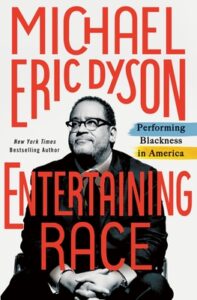 Entertaining Race: Performing Blackness in America Michael Eric Dyson (St, Martin’s Press) $32.50 OUR SALE PRICE = $26.00
Entertaining Race: Performing Blackness in America Michael Eric Dyson (St, Martin’s Press) $32.50 OUR SALE PRICE = $26.00
We have long, long been a fan of the amazing Michael Dyson. He has been an icon in black church and black academic circles (in Philly, especially) for decades. We have stocked most of his books and recommend them all. In the last few years he has been prolific and passionate in small sized manifestos such as Tears We Cannot Stop: A Sermon to White America and Long Time Coming: Reckoning with Race in America, and What Truth Sounds Like: Robert F. Kennedy, James Baldwin, and Our Unfinished Conversation about Race in America.
What is so interesting about this pastor, scholar, public intellectual, is that, like, say, Cornell West, he has drawn much from black popular culture. I think the first book I ever read by Dyson was Holler if You Hear Me which was about Tupac. He has written about Jay Z, he has written about Marvin Gaye.
And here, he brings much of his scholarly and prophetic and religious and artistic interests together by exploring this double or triple entrees about entreating race.
One public leader has said Dyson is “one of the most remarkable thinkers in America today” and another review says he is “a true gift to our culture.” Indeed.
In a way, Entertaining Race is a greatest hits performance of Mr. Dyson, as most of these pieces (starting as early as 1991) have been published (or were delivered) elsewhere. Some of this showcases him at his prophetic best, preaching and speaking and writing; there are reviews and op-ed piece, stuff about the entertainment business, interviews with black leaders such as Abraham X. Kendi and Ta-Nihisi Coates, as well as public thinkers such as Alicia Garza and Jordan Peterson. Most of it hasn’t been widely circulated so for most, it is a new, deep, expansive collection — over 500 pages of his passion, insight, bombast, rumination.
And he is confident of much. Here are the first lines of “The King of Pop and the Queen of Everything” in which he explains his well known love for Beyonce.
Beyonce symbolically snatched from Michael Jackson the crown of best entertainer on the globe, ever, when, ironically enough, the curls atop her glorious crown got snatched into the blades of an electric fan. While that event had hardly anything to do with her ascent, it certainly had a lot to do with the performance of a Black and female identity that could meet any challenge on any stage at any time as she maintained her dignity and cool.
If you want a very entertaining summary of the meaning of the title, and then, more, a hilarious schtick about Beyonce being the Best Ever, you’ve got to watch this clip of Michael Eric Dyson from a few weeks ago on Late Night With Stephen Colbert. You bet I stayed up to watch it. Really, it’s good.
I like that in Entertaining Race there is a sidebar introduction in a little gray box that tells you, sometimes at great length and eloquence, the setting for the given chapter — a concert review, a speech, a class, a protest, a scholarly essay, a sermon, an interview, a Divinity School lecture, a debate. It makes this even better than a compilation or anthology, allowing it invite us into his career(s) and work and life. I’m a fan of those introductions, so don’t skip them.
And, wow, there are good lines here! In one speech given as he presented a journalism award to Nikole Hannah-Jones, he writes of “short declarative sentences in service of expansive truth” and thus describes “the epic sweep of her beautiful prose” as “like Hemingway being mugged by Morrison.” In a clever title to a piece about the famous Pittsburgh playwright, he notes “The Blues of August Wilson.” In a section called “God in the Public Square” he has a chapter called “Abraham Isaac, and Us (and Hagar and Ishmael and Trayvon and Michael Brown, too.)” His 2008 Harvard Black Commencement Celebration speech is here, entitled “The Weltanschauung of Lil Wayne, or, What You Can Do With a Harvard Degree.” His piece, originally published in Newsweek, about reparations, is called “King’s Dream, Rihanna’s Demand.”
You get the picture. It is a book to spend years with, perhaps, laughing and crying and maybe scratching your head a bit. He is hard-hitting about racism and injustice, but is not only in the key of lament. He truly enjoys pop culture, film, music, theatre. Some of these chapters are about sports, which he obviously enjoys. Some about politics and some are pretty weighty. He knows the West’s intellectual history well and is schooled in philosophy and intellectual history and can also bring in hip hop and Hollywood references in his discussions of Descartes or Abraham Lincoln or in discussion with, say, Jean Bethke Elshtain. And did I mention he adores Beyonce?
But that doesn’t mean he’s always seen as cool, let alone beloved — he got death threats and called out by his chancellor, with demands that he be fired from the University of North Carolina in 1996 when he defended pop culture, citing Kurt Cobain to Snoop Dogg in a notorious, big commencement speech. He includes it here, saying, “you can read for yourself whether the criticism was warranted.”
 Renovation of the Heart: Putting on the Character of Christ 20th Anniversary Edition Dallas Willard (NavPress) $27.99 OUR SALE PRICE = $22.39
Renovation of the Heart: Putting on the Character of Christ 20th Anniversary Edition Dallas Willard (NavPress) $27.99 OUR SALE PRICE = $22.39
We only met Dallas Willard once and it was fascinating and an honor. Only later, though, did we realize his outsized significance as a philosopher and guide to the deeper spiritual life, rooted in the contemplative disciplines of classic spiritual formation and a disciple-making passion rooted in solid evangelical theology. That he was one of the early voices to mentor Richard Foster (and encourage him to write Celebration of Discipline) itself shows his importance. That he encouraged formational practices that actually yielded inner transformation and in-depth Christ-like character, that itself yielded honest-to-goodness Jesus-following discipleship, makes him simply one of the most important voices in religious publishing in the last 50 years. I do not think that is an overstatement nor is it uncommon to note that he brings together these various features of whole-life discipleship in a way that is nearly rare. Heart. Mind. Body. Soul. He’s all about that kind of Kingdom living from the inside-out, in balanced and wholistic ways. He has influenced authors like Ruth Haley Barton, Jan Johnson, John Ortberg, Mindy Caliguire, J.P. Moreland, Curt Thompson, Esther Meek, Jim Wilder, and Jamie Smith shows his impact.
It isn’t every day that contemplatives like Richard Foster and sociologists and cultural thinkers like Os Guinness and hip young pastor like John Mark Comer all grace the back cover of a classy book like this.
Spirit of the Disciplines may be his breakout book that was seriously noticed and Hearing God may be the best book on that subject and his Divine Conspiracy (book one and book two) are his most famous. But this, Renovation of the Heart, is my favorite, his most accesible, and the one I tell those new to Willard to start with. And then, when folks read his work — even the lesser known ones like The Great Omission: Reclaiming Jesus’s Essential Teachings on Discipleship and Knowing Christ Today: Why We Can Trust Spiritual Knowledge and The Allure of Gentleness: Defending the Faith in the Manner of Jesus — they circle back and re-read this. Many folks say it was among the most transforming books they’ve read and many say it is their most beloved Dallas Willard book.
That Renovation of the Heart came out 20 years ago is remarkable to me. That it has now come out in a nice hardback with a formal looking cover is special. There is a new Forward by John Mark Comer which is excellent. There is a fascinating new Afterword by Natasha Sistrunk Robinson (you may recall our review of her amazing memoir as a woman of color called A Sojourner’s Truth) and there is a bonus chapter never before in print called “Dallas Willard Discusses Renovation of the Heart.” It is very good.
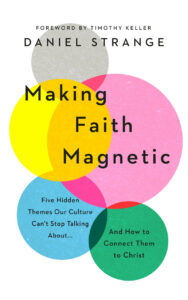 Making Faith Magnetic: Five Hidden Themes Our Culture Can’t Stop Talking about…And How to Connect Them to Christ Daniel Strange with a Foreword by Timothy Keller (The Good Book Company) $16.99 OUR SALE PRICE = $13.59
Making Faith Magnetic: Five Hidden Themes Our Culture Can’t Stop Talking about…And How to Connect Them to Christ Daniel Strange with a Foreword by Timothy Keller (The Good Book Company) $16.99 OUR SALE PRICE = $13.59
This is a remarkable book and I’m so glad we discovered it. It works on several levels and my quick skim made me want to go back and study it with care. For anyone wanting to understand cultures and “social imaginaries” and worldview and how these frameworks shape our visions of life (and the good life) this is fascinating. For anyone wanting to share the gospel with people in meaningful ways, showing how Christian faith is relevant and significant for their real lives as they see them, again, this is a major tool — a hack, a work-around, maybe — for doing evangelism in what Charles Taylor, now famously, has called our “secular age.” It really is a vital new book — Keller calls it “terrific.” Nola Leach says it will”empower you to engage with people and culture” and William Edgar (a master of cultural apologetics himself) says it is “Superb. This book,” Edgar continues, “is as magnetic as its title.” A UK evangelist, J. John, says it is “profound, perceptive and wonderfully fresh.” The author, after all, is pretty pop-culture savvy (having written a great little book about living well in the world called Plugged In: Connecting Your Faith with What You Watch, Read, and Play.)
But here’s a fun and nearly funny thing. These endorsing blurb by those who wisely recommend Making Faith Magnetic for its fresh and “down to Earth” approach, its insights about culture, its ability to help us “engage” (because it is “wonderfully fresh”) also know that this book has emerged from the author’s curious discovery of a teaching from a Dutch missiologist from a hundred years ago, J.H. Bavinck. (He was a great writer, by the way, an innovative thinker, related to the more famous Herman Bavinck of the era of the renewal in Holland under the leadership of Abraham Kuyper.) Daneil Stranger tells us that Bavinck, in his interest in comparing and contrasting and making the Christian faith understandable and attractive to other world religions, found five themes that, in one way or another, every world religion tries to answer. These are sort of what Walsh and Middleton in Transforming Vision (or, cribbing from them, what N.T. Wright in The New Testament and the People of God) call “worldview questions.”
If you want to have fruitful conversations with your friends or co-workers or relatives about the things that matter most, about deeper matters of concern to everybody, of how our stories have to answer or give an account for certain human longings and needs, then Making Faith Magnetic will be worth reading. Just like Daniel Strange invited (in Plugged In) to enter other’s worlds, other’s stories, appreciating their “frame of reference” and (in that case) entertainment choices, we can more generally find these “themes” folks think about and build bridges to the gospel
As Keller points out in the good foreword to Making Faith Magnetic, by backing up and recalling the role of stories in Plugged In, he notes that we can both affirm the big questions and expose as inadequate the answers offered by the distorted narratives and false gods of our culture. (Simply, I’d say, we can say, yes, work is good, but, not, it isn’t a key to identify. Yes, money can help in some ways, but it isn’t a key to good life. Etc.)
Keller says this approach is called ‘subversive fulfillment’ and “is the essence of good apologetics in a post-Christian, post-modern society.”
Enter this new book which (again, happily drawing on five topics clarified by Bavinck years ago) shows us “hidden themes our culture can’t stop talking about.” They aren’t just simple talking points or hot topics, so you’ll have to dig in to understand this language (of words like totality and norms and deliverance and destiny and higher power.) It’s extraordinary.
Strange then, after chapters on the five magnetic points, in the second part (called “The Magnetic Person”) he shows how Jesus fulfills those very longings. He connects the dots and shows us how to do it. What an amazing little book this is, helping us be effective in our conversations, offering a fresh (old?) paradigm for meaningful, contextualized evangelism.
There is, by the way, an appendix called “Magnetic Preaching” by which he means, of course, doing this strategic process inspired by Bavinck’s missiology. Trust me, this is good stuff. Enjoy!
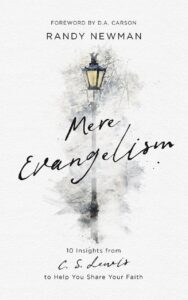 Mere Evangelism: 10 Insights from C.S. Lewis to Help You Share Your Faith Randy Newman (The Good Book Company) $16.99 OUR SALE PRICE = $13.59
Mere Evangelism: 10 Insights from C.S. Lewis to Help You Share Your Faith Randy Newman (The Good Book Company) $16.99 OUR SALE PRICE = $13.59
I hope you recall a review we did three years ago of a book called Unlikely Converts: Improbable Stories of Faith and What They Teach Us about Evangelism by Randy Newman. In that book, Randy presents the results of intriguing research he did a couple of years ago. He got in touch with recent converts to Christ and asked them how they came to faith, what drew them to Jesus and His church and how they heard the gospel as good news. Each chapter explores a lesson learned by recent converts, letting us learn from them how best to help the good news sound and become persuasive. Just for instance, nearly every person said they heard the invitation to know God, to find salvation, to accept Christ, to join the community of faith — worded differently, perhaps, each time — several times before it sunk in and took root. That is, like Jesus said, there’s a lot of seed sowing that has to go on and we should realize that there is a bit of a chain of influence among those who see or hear our witness. Interestingly, almost every single person reported some sort of supernatural episode, too; at the very least, and always, they came to know that people were praying for them. And so on — lessons learned as we listen to the stories of those recently adopted into the family of faith.
That book of stories from “unlikely converts” is only one of several good books Mr. Newman has written. (Many love his book Questioning Evangelism, which we also recommend.) He is, as much as anyone I know, an expert on these things. And he’s had his ups and downs, too. He’s shifted and grown, learned much and refined his insights and strategies. Which leads us to this brand new book.
If Unlikely Converts developed principles for sharing one’s faith drawn from the real stories of real seekers and skeptics who came to faith, Mere Evangelism —the very title a play on the famous book Mere Christianity of course — draws principles for sharing one’s faith drawn from the life and the writings and the stories of none other than C.S. Lewis.
Randy works for the C.S. Lewis Institute in Washington DC and is admired for his kindness, humor, sharp mind, and his ability to listen well and speak well to those who may or may not be interested in the Christian faith. He admits to be reluctant, himself, which means he really did have a lot to learn with Lewis. Lewis called himself the least likely convert in all of England, and then, it seems, as much as he corresponding and talked with people and spoke and wrote about an apologetic for reasonable, imaginative faith, he didn’t fancy himself an evangelist. Oh my, heaven forbid.
Randy came to Christian faith (he was raised in a colorful family of liberal New York Jews) by reading Mere Christianity. It seems he must have been thinking about writing a book like this for most of his adult life. In it he draws on Lewis’s life and work (and the Biblical theology that shaped it) to give us ten key insights “which will both prepare and inspire us to share our faith today.”
We have gotten a number of new books in recent months and years about C.S. Lewis. This one by Newman on learning from Lewis surely deserves to be on the list of anyone who likes reading about Lewis and his world, Lewis and his faith, Lewis and his writing. This belongs in the library of anyone who collects books about the most famous Inkling.
But then, also, this is a must-read book for anyone who wants to be more honorable and faithful (and hopefully effective) in talking about one’s faith journey, about sharing God’s love, about doing evangelism in a wise and interesting way. Mere Evangelism gives you 10 good points, from Newman, cribbing from Lewis, drawing (among other things) on both reason and imagination. What a great idea for a book. And the imaginative and interesting Randy Newman is just the person to write this book. Enjoy!
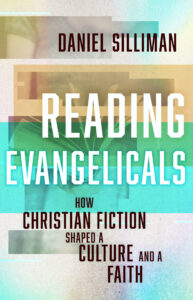 Reading Evangelicals: How Christian Fiction Shaped a Culture and a Faith Daniel Siliman (Eerdmans) $27.99 OUR SALE PRICE = $22.39
Reading Evangelicals: How Christian Fiction Shaped a Culture and a Faith Daniel Siliman (Eerdmans) $27.99 OUR SALE PRICE = $22.39
This is another one of those fascinating and tremendous books that deserves a much longer review than I have time for here. I hope to revisit this for a number of reasons but here I can entice you by summarizing it’s simple project and spilling the beans on just a basic point or two. The subtitle tells you the too-great-of-an-idea to be true and the main titles tells you part of the point. It’s a play on words: we are reading evangelicals, studying them, trying to see who and what shaped the last 50 years of this movement of conservative (but not quite fundamentalist) mostly white American Protestants. And we realize they are a “reading” people. At the popular level they may be reading some unique inspirational fiction, but read it they have. The five books highlighted in this major work not only shows who the authors are and what their books were like but also a bit about how those book both influenced and gave voice to a certain sort of attitude about life, faith and the culture among conservative evangelicals.
We can study the much-discussed evangelical faith movement (not to mention their voting patterns, insofar as there are any) by — yep — talking a look at mega-selling books from This Present Darkness to Amish fiction to the huge-selling “Left Behind” series.
As historian and evangelical scholar (and keen observers of evangelicals) Mark Noll writes,
Siliman’s patient account of million-selling evangelical novels is full of unusual wisdom about the authors of these books, but also their publishers, the bookstores that sold them, and (not least) the multitudes who have read them. Silliman’s depiction of American evangelicalism as an ‘imagined community’ defined in large part by these best sellers is thought-provoking in the best way possible.
It has long fascinating us, as a store somewhat in the thick of all this, what sort of currents and beliefs and pressures and teachings create a desire for books like the ones studied in Reading Evangelicals? From Jeanette One to Beverly Lewis (who was fabulous, by the way, when we had here in the store on two occasions) and from Peretti to LaHaye — who reads these kinds of books and why? (The only other book that comes close to this, more focused and a tad academic, is the wonderfully fascinating Johns Hopkins University Press book by Valerie Weaver-Zercher, The Thrill of the Chaste: The Allure of Amish Romance Novels.)
Kristin Kobes Du Mez says that Reading Evangelicals by Silliman is:
Beautifully crafted and deftly argued, Reading Evangelicals offers a deeply perceptive analysis of modern evangelicalism through the lens of popular Christian fiction. Carefully researched and laden with keen insights, the book will stand as an essential contribution to the study of American evangelicalism.
So, yes, there is some literary criticism here, so to speak. Siliman looks directly at the texts like Love Comes Softly and The Shack — the first and last chapter, actually, and we learn about the writing and publishing and marketing and reception of the books. But, as we’ve noted, there is more going on here as Siliman moves from these books to what they stand for, how they shaped generations, and how evangelicalism as a movement and theological force within the country, has been in many ways influenced by the family-owned bookstores and religious publishing chains that push these kinds of stories. By. The. Millions.
(Or, as in the case of The Shack, how many didn’t, with some store’s and chains life LifeWay banning it.)
Love these books or not, this is an amazing thesis, a great project, and a thrilling read. And, by the way, if you are one of the few in American religious circles who don’t know these authors — as I’ve already heard one book loving evangelical reviewer say, and as I can nearly hear dozens of my mainline Protestant clergy friends saying even now — then you just aren’t paying attention. These are novels you should know because they have, in one way or another, influenced the religious landscape of our times and the faith of neighbors, friends, and fellow church folks.
Reading Evangelicals is a very valuable book which will bring you up to speed on this tributary of the best sellers lists and it will give you a balanced and insightful look at this much-discussed religious movement. It’s worth every penny and, as Althea Butler puts it, is “a winsome yet incisive study” that is “a worthy and essential read for anyone who wants an in-depth, compassionate look at the evangelical culture of reading.”
I love how sociologist Grant Wacker (and recent biographer of Billy Graham) puts it:
Though evangelicals have never produced a Graham Greene or a Flannery O’Connor, their fiction writers have sold millions of copies and influenced millions of readers. Silliman explores this sprawling yet curiously understudied subculture with a golden pen, genuine empathy, and keen insight. He not only carefully summarizes the narrative of a dozen or so key texts but also draws on social scientists such as Max Weber and Jürgen Habermas to show how they addressed the spiritual needs of their time. In Silliman’s hands the topic receives the sophisticated yet accessible treatment it richly deserves.
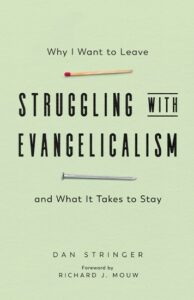 Struggling With Evangelicalism: Why I Want to Leave and What It Takes to Stay Dan Stringer with a Foreword by Richard Mouw (IVP) $17.00 OUR SALE PRICE = $13.60
Struggling With Evangelicalism: Why I Want to Leave and What It Takes to Stay Dan Stringer with a Foreword by Richard Mouw (IVP) $17.00 OUR SALE PRICE = $13.60
They had me with the Richard Mouw foreword, and then the clever hint on the cover of a barn-burning match and a building nail. Which will it be, burn down the house or fix it up? Isn’t that the question?
And Mr. Stringer, I’m happy to report (I think) finds his way to pick up — as the old Indigo Girls song puts it — a “Hammer and a Nail.” Although he, too, sings with the passions of a revolutionary, at the end of the day he has the wisdom of a reformer. Not surprising for somebody influenced by the prophetic and irenic Dr. Mouw.
This is not the first of the many books about this, and, as I’ve said before, these sorts of books are good for mainline Protestants, and others, too. (I’d invite you to read read my lengthy review of the excellent Still Evangelical?) Nearly anyone can benefit from the mostly in-house discussions about what makes a religious tradition acceptable or not, worth saving or not, whether renewal is plausible or not or whether emerging expressions and “new things” (Isaiah 43:19 ) are warranted. This should be of interest to anyone that has any interest about religion in our society.
If you are mostly proud and comfortable with evangelicalism, from, say, The Gospel Coalition to CT to the Passion conferences to the CCCU to Acts 29 to ECPA to K-Love radio to your neighbor community church (not to mention the neo-fundamentalism of the religious right) you really need to see what the more thoughtful (if frustrated) children of the movement have to say. If you are not comfortable calling yourself an evangelical any more, it still is quite helpful, I’m positive, to see how this conversation is developing. In other words, I hope Struggling with Evangelicalism is very widely read and seriously considered. In fact, if you’re an ex-Christian or non-Christian or (as I’ve said above) from a mainline Protestant or Catholic tradition, I’d invite you to consider this book just to see how some believers are working through these issues. It might give you insight and maybe admiration for the open-minded and honest among them.
Read these two carefully written and very illuminating endorsements of this important book:
Part memoir, part sociological study, and part theological reflection, this honest and winsome book is for any Christian who uneasily identifies with historical evangelicalism. Reframing it beyond the brand that has become increasingly problematic, Dan Stringer uses his own life experience, which has stretched beyond North American contexts and assumptions, to both call and equip those of us who inhabit evangelicalism to the shared task of attending to — and renewing— our own space. As one who has been uneasy with the evangelical moniker, even while being firmly part of its institutions and community, I am grateful for perspective he brings in this timely book. I believe many others will be too. — Tod Bolsinger, Fuller Seminary Church Leadership Institute, author of Canoeing the Mountains
The ambivalence of what it means to be evangelical is addressed honestly and courageously through Dan Stringer’s prescient reflections on the present and future of evangelicalism in the world today. Through the background of his own cultural hybridity, Dan weaves his struggle with evangelicalism by reformulating traditional theological approaches with a refreshing model of awareness, appreciation, repentance, and renewal. In this process he offers us his greatest gift — his authenticity. With remarkable and compelling words, this book captured my imagination and inspired within me generative ideas that challenged my own thinking with gutsy realism. It is not just a narrative of his own journey. It is about ours as well. With a firm and gentle invitation, Dan craftily ushers us into the struggles and hopes we all face. In doing so, we will discover who we are and by doing so, begin to embrace the space in which we belong. — Randy Furushima, president emeritus of Pacific Rim Christian University
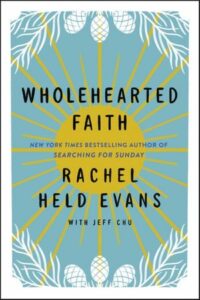 Wholehearted Faith Rachel Held Evans with Jeff Chu (HarperOne) $26.99 OUR SALE PRICE = $21.59
Wholehearted Faith Rachel Held Evans with Jeff Chu (HarperOne) $26.99 OUR SALE PRICE = $21.59
We were glad to highlight this a bit before it came out and we took a good number of pre-orders. Now that it has been here a few weeks and we’re starting to hear some feedback and there are reviews and opinions (pro and con) all over social media, I’m not sure what more I can add in this quick space. We want you to know, as we said in our invitation to pre-order it, that we cared for Rachel even though we were only together twice. I even argued a bit with her about something — I don’t know what. We were early fans of her first memoir, and then that wild second one about taking Bible commandments about womanhood literally for a year. Other than the great A.J. Jacobs who does something like that?
Many know that RHE had started a conference (with her good friend Sarah Bessey) for those who were in faith struggles, ex-evangelicals, doubters, skeptics, seekers, maybe those involved in what now some now call deconstruction. (It was and still is called Evolving Faith, which is funny since she lives still in Dayton TN, the town known for the historic anti-evolution Scopes trials.)
We’ve always said that doubt and change and growth is a good thing (some folks actually believe that old Reformed slogan, Ecclesia Reformata, Semper Reformandam don’t ya know) so we appreciated her probing and questions and making a case for fresh interpretations and new expressions of faith. We’ve always had a heart for those on the fringes of the faith community, too — Beth and I used to work in campus ministry in the ’70s, after all, and spent countless hours with young people who had not found church to be meaningful for them. If we had somebody like Rachel writing in those days, I am sure her books would have been useful tools, a blessing, even, to help the bored or skeptical or hurt. In these more vivid, postmodern and polarized days, her critique of customary faith, especially of a Southern fundamentalist sort, and of the idols of rationalism and white privilege are amped up as has been the backlash against her.
She died very suddenly in 2019, leaving behind a husband a little children. Her absence among them and her many friends is what is worst, but she is missed as a public voice, too. She passed even as she was rising, becoming an increasingly known voice, almost an icon, of young, questioning, ex-evangelicals who maybe still loved the Bible and Jesus and church — so much so that she was being reviewed in The New Yorker and Vox and HuffPost, and was even on The Today Show (ahh, she could be charming and was a very lovely spokesperson for an evolving faith, searching for Sunday, as one book put it.) Who knows what God would have done through and in and for her? It is a sad, sad thing for many of us in religious publishing to feel her loss; I cannot imagine what her family and friends and most loyal fans have been enduring these past few years. We still want to offer condolences for the loss.
Maybe this new book will bring some solace, knowing that more of her work is offered up, out there, available, still. With 15 chapters, the lovely, inviting title, and nice look, Wholehearted Faith is a good book, not weird or hard. She was starting to write about this notion of wholeheartedness, and the book was in the works when she passed. Rachel’s husband, Dan, invited her Evolving Faith colleague, the journalist and author Jeff Chu, to finish it up for her.
Here is how the publisher describes how it came into it’s final shape: “With the help of her close friend and author Jeff Chu, that work-in-progress has been woven together with some of her other unpublished writings into a rich collection of essays that ask candid questions about the stories we’ve been told–and the stories we tell–about our faith, our selves, and our world.”
As the always observant (and excellent writer) Barbara Brown Taylor says, we “owe Jeff Chu a deep bow.” Right! As she writes,
A voice like Rachel’s endures in the time machine of her writing. All who love the sound of it owe Jeff Chu a deep bow. A vision like hers outlives a single lifetime. What she discovered, she made available to us; now it’s our turn to carry on. — Barbara Brown Taylor, author of An Altar in the World and Learning to Walk in the Dark
Here are some friends of hers who are recommending it, and they tell you why.
If you feel even a shred of internal division, Wholehearted Faith will help you put the pieces back together. This book is a special gift — I’ve already gone back for a second and third read. Each page invites you toward an honest and humane wholeness. – Brian D. McLaren, author of Faith After Doubt
Gorgeous, heartfelt and bittersweet. Rachel Held Evans spent her beautiful life trying to convince us that, all along, God’s love was for absolutely everyone. At last, we must believe her. — Kate Bowler, author of No Cure for Being Human and Everything Happens for a Reason
There is also a fabulous afterword/epilogue by Nadia Bolz-Weber at the end. She is such a good storyteller and wordsmith, I read it first and cried. I liked how she noted that she and Rachel were culturally pretty different (“her, a short, pretty, Southern young woman in a cardigan, me a tall, tattooed, city gal in jeans and a black tank top. Rachel always delighted in telling audiences “I’m so lad Nadia and I became friends as adults because if we had known each other in high school she would have scared the bejeezus out of me.” No, they didn’t look like they’d be friend. In her afterward, Nadia says hey they were and shares her own grief.
I don’t know who wrote this (Jeff?) but it seems right to me:
This book is for the doubter and the dreamer, the seeker and the sojourner, those who long for a sense of spiritual wholeness as well as those who have been hurt by the Church but can’t seem to let go of the story of Jesus. Through theological reflection and personal recollection, Rachel wrestles with God’s grace and love, looks unsparingly at what the Church is and does, and explores universal human questions about becoming and belonging. An unforgettable, moving, and intimate book.
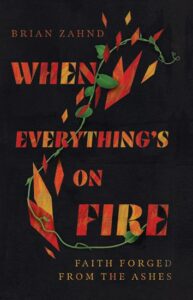 When Everything’s On Fire: Faith Formed from the Ashes Brian Zahnd (IVP) $22.00 OUR SALE PRICE = $17.60
When Everything’s On Fire: Faith Formed from the Ashes Brian Zahnd (IVP) $22.00 OUR SALE PRICE = $17.60
Brian Zahnd is one of our most intriguing writers and church leaders that we are always glad to be able to celebrate his curious (if sometimes controversial) books. Let me just say it, whether I agree or not with all of his views, I dig this guy. From one of his early books — on a charismatic publishing house, on aesthetics, called (cribbing from Dostoevsky) Beauty Will Save the World — I knew he was a live wire and well worth reading. A Dylan-quoting Pentecostal? A guy who reads more widely and deeply than many of our best pastors and who writes vibrantly, maybe inspired by his own extraordinary experiences with the Holy Spirit? Wow.
And then he wrote a couple of very powerful books on forgiveness. Which lead to yet another surprise, a stellar book called A Farewell to Mars: An Evangelical Pastor’s Journey Toward the Biblical Gospel of Peace which prophetically challenges the God-and-country nationalism of war and invites us to consider an evangelically-rooted, Biblical vision of nonviolence.
He wrote a few books about being disgruntled with conventional church (see his short memoir, Postcards from Babylon: The Church In American Exile) making overtures towards new understandings of the cross, the atonement, the nature of hell and the like. In conversation with everyone from Rob Bell to Michael Hardin to Bradley Jersak to Sharon Baker he is both innovative as a thinker and committed to Christ and His Kingdom above all. Whether he is precisely right in all this is a matter of some conversation but I will highly recommend his inspiring Sinners in the Hands of a Loving God for a good example of the roots and branches of this gracious and Christ-like approach. As admired and reliable evangelicals like Rich Villodas has said, “Time and again, Brian Zahnd has demonstrated an uncanny ability to help us navigate this present age…” And as stalwart pastor-preacher-theologian Fleming Rutledge has put it, “Brian Zahnd’s unique voice is neither ‘liberal’ or ‘conservative.”
As Fleming Rutledge continues, regarding his voice and approach,
It is both cheekily irreverent and profoundly faithful. Above all, it is Christ-centered. I just wish the church would listen to him more.
Which brings us to this brand new one that I have not read yet, but that seems to be exceptionally solid intellectually, pastorally gracious, theologically robust, and, I suspect, surprising on many fronts. He cites scholars as diverse as Jacques Derrida and Sergius Bulgakov, Karl Rahner and David Bentley Hart, James Cone and (yes!) Bruce Cockburn. That our friends at IVP released this is a good sign that they do not deem his manifesto to be less than orthodox and that it may be — please God! — a balm for many who are hurting, even devastated by the weird confluence these days of a too-often shallow and corrupted faith community and the cross-pressured weight of secularism.
As it says on the back cover of this important work:
In an age of secularism, skepticism, and cynicism, our worldviews have been shaken. Various solutions exist — some double down on certainty, while others deconstruct their faith until there is nothing left. But Brian Zahn offers a third way: what is needed is not a demotion but instead a renovation of faith.
I hope to weigh in later, but for now, I trust Rich Villodas who says about When Everything’s on Fire,
Whether you are losing your faith or want to help others hold on to it, we would do well to have Zahnd take our hand and be our guide.
Or, consider the words of the colorful Jonathan Martin,
But I believe the book you are holding now is one that truly only Brian Zahnd could write, and the precise book we needed him to write in this particular moment. His gift is clarity, and the way he focuses his prophetic vision here is so lucid, singular, and laser focused, it is almost blinding. Zahnd does not offer us certainty in uncertain times, which is always just a bad magic trick, anyway–he offers something much better: beauty. This is a flaming, scorchingly beautiful vision of faith in a world where faith has left many of us in the cold.
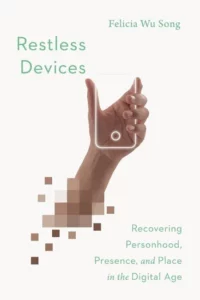 Restless Devices: Recovering Personhood, Presence and Place in the Digital Age Felicia Wu Song (IVP Academic) $24.00 OUR SALE PRICE = $19.20
Restless Devices: Recovering Personhood, Presence and Place in the Digital Age Felicia Wu Song (IVP Academic) $24.00 OUR SALE PRICE = $19.20
We have been delighted over the years to receive orders and get to send boxes of books to various Christian study centers that are often located near major colleges and universities. (There is even a network of these Christian think-tanks and discipleship communities situated at our best research universities; our friend Charles Cotherman told the fabulous story of their formation over the years in his impressive To Think Christianly: A History of L’Abri, Regent College, and the Christian Study Center Movement.) Some of our friends in that movement, including the good folks at Chesterton House at Cornell, have told us about Felicia Wu Song (with her PhD from UVA) as a astute cultural sociologist and woman of deep faith who has brought her Christian perspective to bear on her scholarship on media and digital technologies. (She current teaches at Westmont College in California.) She is known in the growing field, having published scholarly pieces in journals such as Gender & Society and the prestigious Information, Communication & Society. Part of her impressive work has be around what it means to create “virtual communities” in this “bowling alone” ear.
There are lots of good books that explore the social and cultural impact of digital media. There are lots about habits and practices in our own life as we navigate being disciples in this digital age. However, there are few books that bring together such serious socio-cultural analysis, important philosophical considerations about technology, vibrant faith and a hopeful Christian imagination as does this new Restless Devices.
As one reviewer noted, “In our current digital ecologies, small behavior shifts are not enough to give us freedom. We need a sober and motivating vision of our prospects to help us imagine what kind of life we hope to live — and how we can get there.”
And isn’t that a huge, elephant in the room whenever we are setting ground rules about our use of technology — what kind of people are we becoming and what kind of people do we want to be?
Listen to these excellent recommendations, suggesting this book for your consideration:
I have been looking for this book for years. Dr. Song brings the top scholarship and the deepest Christian reflection to bear on the important spiritual topic of how we faithfully engage our devices. In this digital age, which requires new forms of moral and spiritual reflection, there are few topics that could be more relevant or more needed. This is a book I will read again and again. — Elaine Ecklund, professor of sociology at Rice University and author of Why Science and Faith Need Each Other: Eight Shared Values That Move Us Beyond Fear
Digital media has shaped our spiritual lives and churches in profound ways, yet we have few guides to navigate this new terrain. I have longed for a book like Restless Devices to be written. Felicia Wu Song compellingly examines the addictive qualities of digital media–its ubiquity and totalizing power. But her depth of expertise and profound Christian imagination allow her to go further than mere critique. She offers us practical hope in the ‘counter-liturgies’ of the Christian faith. I highly recommend this powerful work of spiritual formation to all who seek to live humanely and faithfully in our digital age — Tish Harrison Warren, Anglican priest and author of Liturgy of the Ordinary and Prayer in the Night
Dr. Song unpacks a modern digital landscape that is cracked and parched–but she doesn’t leave us in our thirst. Instead, she extends her hand and guides us back to the source of living water by way of a well-trodden path she has traveled with her students throughout her professorship. It is a true gift to journey with Dr. Song toward a reimagined relationship with our devices–one where we’re transformed less by them, and more by Christ. — Krista Boan, cofounder of START: Stand Together And Rethink Technology
Good sociology spurs relevant theological inquiry. Sound theology has powerful sociological implications. Restless Devices has both good sociology and sound theology, making it a prophetic book for our times. I am grateful for Dr. Song’s work, which shares how we can move from permanent connectivity with our devices to abiding with Jesus in an attuned, embodied, and collective manner. — Russell Jeung, professor of Asian American studies and author of At Home in Exile: Finding Jesus Among My Ancestors and Refugee Neighbors
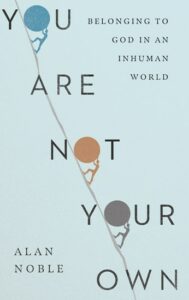 You Are Not Your Own: Belonging to God in an Inhuman World Alan Noble (IVP) $22.00 OUR SALE PRICE = $17.60
You Are Not Your Own: Belonging to God in an Inhuman World Alan Noble (IVP) $22.00 OUR SALE PRICE = $17.60
This is a substantial book that deserves a careful consideration. I cannot even begin to do it justice in a quick announcement here. I’m a very big fan of the clever and brilliant Dr. Noble and appreciate the light touch in his writing, even though we know he has dug deeply and pondered much. He got his PhD from Baylor and is now a lit prof and editor-in-chief of Christ and Pop Culture. He’s an advisor for The AND Campaign. He’s a good guy and this is all very good work.
His first book was Disruptive Witness: Speaking Truth in a a Distracted Age was spectacular (and is more urgently needed now as it was then.) We named it a Best Book of 2019 — this new one will be awarded widely as well, I’m sure, as many are coming to appreciate Doc Noble’s insight and good, good writing. You Are Not Your Own could also be called You Are Not Alone, but, here, he plumbs our human condition, drawing from that key New Testament text (and that lovely question from Heidelberg Catechism.) Our distracted loneliness is only one symptom of a deeper malaise, caused by a deeper belief. And that is that we think we are our own. We are not.
That we belong to ourselves — ‘you’re not the boss of me’ is how some teen-targeted TV show sang it a few years back –is “the fundamental assumption of modern life.”
As it says on the back cover, hinting at the theme of the book,
“If we are our own, then it’s up to us to forge our own identities and make our lives significant. But while that may sound empowering, it turns out to be a crushing responsibility.”
And so, the Biblical notion that we belong to God, that we are not our own, that we are bought with a price, even, is, finally, very liberating news. Up against the zeitgeist and idols of both modernity and postmodernity, the secular age and fever-pitched religiosity, too, this calm and radical insight is worth exploring.
And explore it, he does. Noble offers this counter-cultural, subversive truth in detail, in wise and helpful ways. He shows that this whole autonomy business is damaging and disordered. How he illustrates all this, looking at the very structures of society, is enlightening. (Two good chapters on how society shapes and fails us, are worth the price of the book.) Again, he is a scholar who is a good teacher, a deep thinker with his feet on the ground. As Karen Swallow Prior puts it, You Are Not Your Own is “astonishing in its breadth and its depth, but even more remarkable for ints compassionate and practical wisdom. ”
Listen to every word written here by Duke Kwon (a Biblical scholar and pastor and co-author of Reparations), who sums up the strengths and value of this great book:
Alan Noble has given us a gift. Using one of the most beautifully articulated truths in creedal history as its guide, You Are Not Your Own examines one of the great sicknesses of our age — the soul-crushing malady of self-belonging. With the learnedness of a professor, the meticulousness of a tutor, and the empathy of a friend, Noble guides the reader through crucial questions around personhood, identity, and meaning. And he does so in a manner that is at once exposing and healing for those exhausted (and seduced) by modern life. Importantly, this book offers more than cultural insight and a Christian anthropology; it offers much needed hope, not by commending religious techniques that only add to the burdens of self-optimization, but by commending Christ — the one to whom alone we must belong. Here is a book that is penetrating, accessible, convicting, and in the end, hopeful.
You know that Anglican priest, Tish Harrison Warren, is one of our very favorite writers these days, from her two must-read books and her recent columns, amazingly, in The New York Times. She is astute, always, and a fine writer, so if she says something is worth reading, it is. Tish says:
In You Are Not Your Own, Alan Noble offers a deep diagnosis of the dysfunction and disease in our contemporary culture. And he shows that the challenging hope offered in the first question of the Heidelberg Catechism — that I belong not to myself but to Jesus Christ — is the only cure to this sickness. This is a rich book, eloquently and perceptively exploring the damage inflicted by the myth of autonomy and offering the healing resources of the Christian faith. Anyone hoping for a deeper understanding of our contemporary malaise or wanting to explore what it might mean to belong to Christ should read this timely, well-written, and wise book.
Another little thing — this is a well made book, with handsome end papers and some heft to it. Kudos IVP. This is a book to enjoy and re-read, I’m sure.
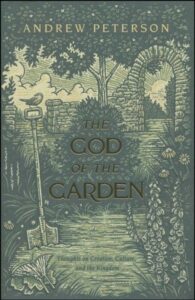 The God of the Garden: Thoughts on Creation, Culture, and the Kingdom Andrew Peterson (B+H) $17.99 OUR SALE PRICE = $14.39
The God of the Garden: Thoughts on Creation, Culture, and the Kingdom Andrew Peterson (B+H) $17.99 OUR SALE PRICE = $14.39
Perhaps you saw this when we offered our big sale on books on the arts that we posted last week. Most of those were very much about a Christian engagement with the arts, books about aesthetics, beauty, and those several grand IVP books like God In the Modern Wing. This was a sleeper in that list, a quiet little memoir by a singer-songwriter and publishing great (he started Rabbit Room Press and has done the great Wingfeather Saga kids books, now out in a great boxed set, btw.) Because we were so fond of Adorning the Dark: Thoughts on Community, Calling, and the Mystery of Making, we really wanted to celebrate this new companion volume which is part memoir but also “an attempt to wake up the reader to the glory of God shining through his creation.”
As it says nicely on the back cover:
…being as honest as possible, Andrew Peterson shares a story of childhood, grief, redemption, and peace, by walking through a forest of memories: “I trust that by telling my story, you’ll encounter yours. Hopefully, like me, you’ll see that the God of the Garden is and has always been present, working and keeping what he loves.” Sometimes he plants, sometimes he prunes, but in his goodness he intends to reap a harvest of righteousness.
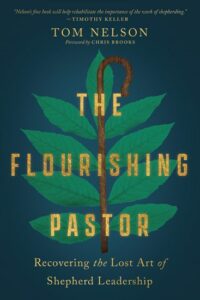 The Flourishing Pastor: Recovering the Lost Art of Shepherd Leadership Tom Nelson (IVP Praxis/Made to Flourish) $18.00 OUR SALE PRICE = $14.40
The Flourishing Pastor: Recovering the Lost Art of Shepherd Leadership Tom Nelson (IVP Praxis/Made to Flourish) $18.00 OUR SALE PRICE = $14.40
This arrived a bit early and we couldn’t be more thrilled to get to announce this brand new title by our friend Tom Nelson. He’s a fine pastor and founder of Made to Flourish, the brilliant networking ministry which helps churches engage culture, specially around a good perspective on developing a Christian view of vocations in the work world. Tom, you may know, wrote Work Matters: Connecting Sunday Worship to Monday Work which told of his own journey as a leader of a local church and what happened as he unlocked for his flock the visions of vocation that lead to a high calling of serving God in the work-a-day world. That book remains a favorite and is a fabulous introduction to thinking faithfully about work. His Made to Flourish organization has offered fabulous resources along these lines (like the little Discipleship with Monday in Mind which is a must-read for church leaders of all sorts) and his book about investing in local economics and community development projects, The Economics of Neighborly Love. I mention this to assure you that he is a reliable, Biblical leader with not only a missional, Kingdom mindset but who has nurtured a growing network of folks dreaming of ways to be salt and light in their local communities. I really, really respect that.
And now, a bit surprisingly, perhaps, Tom has circled back to his own earlier calling, and is considering the vocation of pastoring. Drawn from his own years in the pulpit and pastoral office, inspired, it seems, by what he has learned about work and service, leadership and integrity, vocation and calling, with his focus in recent years on ordinary folks in the work world, he has fresh stuff to say about pastoral leadership, about the job of being a minister in a ordinary congregational setting.
There are those writing about the task of the clergy-person who have perhaps unwittingly (or, wittingly, for that matter) taken their cues from the modern business world and the leadership theories of the professional class and applied them to church life, which, in ends up, is not particularly faithful or, we have found, helpful. A church, of course, is not a business or a corporation. Others, of course, askew all “worldly” knowledge about leadership studies and corporate cultures, and — inspired as we have been by the likes of Eugene Peterson, Winn Collier, Art Boers and the like — we get that. (Perhaps you might see Wisdom from Babylon: Leadership for the Church in a Secular Age by the deeply spiritual Gordon Smith for an excellent and balanced adjudication of all that in these days.)
In any case, it seems that pastoral leadership studies are in flux and in many cases, many pastors are nearly burned out and giving up, hardly able to find time or energy to consider the first principles of their own callings. (We only have to look at the latest Barna research floating around the internet this very week to see the pain and anxiety plaguing pastors these days.)
With a very helpful study guide in the back of The Flourishing Pastor, it would be ideal for a clergy support group, or for any minister to read through him or herself. It is not the only such book, but I trust Nelson a lot, and appreciate his wide research and his passion to rehabilitate the calling of shephard, so that pastors and their flocks might flourish.
When authors and friends I admire offered eloquent endorsements, as they have here, I knew this would be a book I’d love to tell you about. Please read these recommendations. Maybe they will inspire you to buy this for your pastor.
The deepest, truest learning is always over the shoulder and through the heart. In The Flourishing Pastor we are drawn into Tom Nelson’s long labor of love–a vocation born of commitments to biblical theology and missional practice that have formed his work as a pastor among a particular people in a particular place, a vision for his congregation and his city. With surprising candor and humility rooted in an honest spirituality that seriously wrestles with the Word and the world together, this is a window into the mind and heart of someone who longs for the reality of an integral life for himself and for all of us. Every pastor I know would be graced by this apprenticeship in print, a book where words become flesh in the life of a good man who is also a good pastor. — Steven Garber, author of The Seamless Life and senior fellow for vocation and the common good with the M. J. Murdock Charitable Trust
The Flourishing Pastor overflows with practical wisdom from the frontlines of a pastoral ministry that has been both faithful and innovative. Tom Nelson understands the contemporary cultural challenges of pastoral ministry as well as its timeless woes, from the discouragement of grumpy parishioners to the heady lure of celebrity and the loneliness of leadership. This book makes clear the irreducible foundation of the ministerial vocation: intimacy with God that roots one for integrity and resilience over time. Simultaneously, it coaches pastors in a vital, practical skill: discipling congregants in connecting their work and worship. While unpacking it all, Nelson writes with a pastor’s heart, and it’s easy to see why he has been a beloved mentor to many a young pastor. — Amy L. Sherman, author of Kingdom Calling: Vocational Stewardship for the Common Good
In an age of increasing complexity and ambiguity, Tom Nelson invites his readers to consider an ancient model for leadership. Drawing from a deep well of scriptural insight, trusted voices from the past and present, and his own wealth of pastoral experience, Nelson reveals a pathway that leads to flourishing leadership, both personally and organizationally. Pastoral leaders of the present and future would be wise to heed his words. —Terry Timm, lead pastor of Christ Community Church of the South Hills, Pittsburgh, author of A Movable Feast: Worship for the Other Six Days
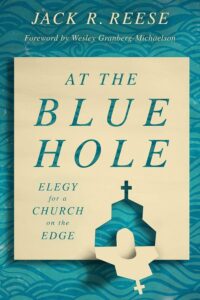 At the Blue Hole: Elegy for a Church on the Edge Jack R. Reese with a foreword by Wesley Granberg-Michaelson (Eerdmans) $21.99 OUR SALE PRICE = $17.59
At the Blue Hole: Elegy for a Church on the Edge Jack R. Reese with a foreword by Wesley Granberg-Michaelson (Eerdmans) $21.99 OUR SALE PRICE = $17.59
Not long ago I was doing a Zoom book announcement about new titles for a clergy gathering. My hawking new titles with vigor was an appreciated part of their pre-Covid conferences, so they tried this on-line approach. I raved about this, which maybe was odd, since it is the story of the decline of a particular (Southern, no-less) denomination. But yet, I thought they’d benefit from it and I maintain my commitment to tell folks about this remarkable volume.
I came first to believe in this book for one simply reason: my friend Wes Granberg-Michaelson has the foreword. Wes has written his own life stories in a couple of big memoirs, and a fabulous recent title about his shift to a deeper, contemplative spirituality, inspired by his hiking the El Camino trail. You’ve got to read Without Oars: Casting Off into a Life of Pilgrimage including its insightful foreword by Diana Butler Bass. But what is significant here about Wes is that he has not only worked with the World Council of Churches and knows various sorts of believers, churches, denominations and para-church ministry the world over, he has served as the President of the Reformed Church in America. The RCA, by the way, is itself a fascinating case study, founded mostly by immigrants, rooted in a conservative sort of Calvinist theology, but willing to be part of the NCC and other associations of mainline Protestantism, they remain viably robust, yet in decline. If you are part of nearly any sort of mainline church, you can relate, right?
Michaelson has been a wise leader through a heck of a lot, and has written books about spiritual leadership and congregational renewal. I say all that only to point out that if he says a book about an obscure denomination that started long before the Civil War in the 19th century is somehow emblematic of where most of us find ourselves here in the secularizing 21st century, then we should take his advise and read whatever he says.
Such was my first intriguing (if I’ll admit, a tad reluctant) dip into this survey of the decline of the Churches of Christ in America. While any of us who have spent any number of decades in the church world will find it poignant to read a pastors elegy of remembrance and will be glad, somehow, for his promise of hope, some will be provoked by his thesis that, to live, we simply must die. (Yes, he is drawing on a key principle taught by the Master; they are, churches of Christ, after all.) As it says on the back, about the calls to claim their own death, “this once-thriving fellowship may yet emerge from the grave into the light of resurrection.”
I simply know of no other book that has a rave review and good blurbs on the back from popular preacher and author Max Lucado and progressive, prophetic, Brian McLaren and Methodist Bible scholar Dr. Elaine Heath. I say that not only because it is a heckuva lot of fun to link Lucado and McLaren, but because it shows that no matter where you find yourself in the denomination landscape, At the Blue Hole has something for you. It is a tale of church life in the 20th century, of changing visions of meaning (and metrics) and renewed expressions of faith. It is a call to missional action and a call to seek a better future. As civility-oriented peacemaker, historian, and scholar Richard Hughes puts it, “At the Blue Hole is a book as wise and refreshing as it is compelling.” In fact, he calls it “riveting.”
As Max Lucado puts it, “Equal parts theologian, pastor, and historian, Jack Reese has written a personal and prophetic book…and a description of what must change.”
There is humility here in this memoir and story of a denomination in decline. And there is energetic hope, a call to return to Jesus. I wonder if you and your church leadership needs this study? I wonder if even in Advent we might consider repenting and waiting and longing and hoping? At the Blue Hole might be an odd read this time of year, but I think its paradox — to live we must die — may be just what makes it so apropos.
In this artful and honest story of his own tribe, Churches of Christ, Jack Reese offers wisdom for all congregations and wider fellowships living with present American society. The pathways for us all m ay not hold the certainties we crave, but they are marked by the sustaining grace we need. The stories on these pages are a gift to illumine our journey. — Wesley Granberg-Michaelson, author of Future Faith: Ten Challenges Reshaping Christianity in the 21st Century
 Home: 100 Poems edited by Christian Wiman (Yale University Press) $25.00 OUR SALE PRICE = $20.00
Home: 100 Poems edited by Christian Wiman (Yale University Press) $25.00 OUR SALE PRICE = $20.00
Of the list of books we did a while ago in the genre of memoirs, in the Advent devotional post, in the great list of books about the arts, and even in some of the ones above, here, there is a reoccurring theme: we must be attentive to our lives, slowing down, even, paying attention in ways that perhaps allow us to enter a space of wonder. We must cultivate a habit of attentiveness, even as we are aware of the culture at-large pulling us in other ways, towards speed and efficiency and pragmatism. Could it be that poetry could help us? Ancient writers and the wisest modern pundits say yes. Poetry is an art form, perhaps as much as any, that requires a certain imaginative playfulness the first requires slowing down.
We needn’t review in great detail here (as we did in the previous post where we mentioned Wiman’s He Held Radical Light, the fame of the poet, his now-legendary bout with brain cancer, his refreshed faith (described in My Bright Abyss) and his working with Miroslav Volf at Yale Divinity School. His last collection of new poems came out earlier this year and is called Survival is a Style. He is a poet we appreciate and esteem.
For what it is worth, a few years ago he edited an anthology of poems with the simple, inviting, title, Joy: 100 Poems. Yep, he pulled together rich and serious poems that inspire joy. (I digress, but it is just fun to note that the Wall Street Journal review of Joy was written by the thoughtful attorney and Christian legal scholar, David Skeel.)
With this new one, Home, he is back at the project, compiling a stunning anthology of 100 poems (or, in some cases, excerpts) about home. Considered poignant and timely, this is a very important occasion, I think.
The following lines from the publisher may make it seem more heady than it needs to be, but it makes for interesting reading itself, helping us see that Home’s collected poems are:
…exploring home’s deep theological, literary, philosophical, historical, political, and social dimensions. Wiman calls home “a house, a country, a language, a love, a longing, a grief, a god.” It’s “a word that disperses into more definitions than one book can contain.”
The tensions between diffusion and concentration, roaming and rootedness, precarity and security are everywhere in this book, often in the same poem. Ranging from early modernism to the current moment, and from southern Africa to the Arctic Circle, the selections are as diverse as the poets included. Collectively they envision an imaginative home for even the most homeless of modern readers. Completed entirely during quarantine, amid the miseries of separation and isolation, the collection offers a powerful vision of home as both a place and a way.
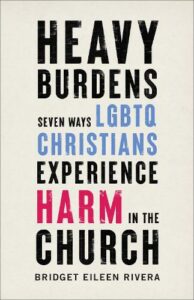 Heavy Burdens: Seven Ways LGBTQ Christians Experience Harm in the Church Bridget Eileen Rivera (Brazos Press) $19.99 OUR SALE PRICE = $15.99
Heavy Burdens: Seven Ways LGBTQ Christians Experience Harm in the Church Bridget Eileen Rivera (Brazos Press) $19.99 OUR SALE PRICE = $15.99
A few weeks ago I told of two memoirs I had read, one by an evangelical praise and worship leader mom who came to accept that her daughter was gay, and the other by a Churches of Christ gal who had written a book disapproving of her own same-sex attractions, only to change her mind, and tell of that story called Affirming.) In both cases I invited readers to slightly bracket out their own theological impulses or Biblical convictions in order to hear the story of these sisters in Christ. Agree or not, I said, just at least try to understand and feel some empathy about their journey.
I was criticized for that on facebook. I get that — we have been criticized for affirming women’s ordination, for taking Jesus literally when he said we dare not kill, for naming Mammon as an idol as the Bible does, for being pro-life and for writing about books that take climate change seriously. On one hand it comes with the territory (we may have quirky tastes, maybe even quirky convictions) but it also made me sad. Again: a recent batch of memoirs of told the stories that have long been inadequately heard or honored among many churches. Gay and lesbian and trans folks, especially younger folks, have been treated poorly in many churches. They’ve been yelled at, harshly prayed over, sent away, told to kill themselves. I think you all know this and if you do not oppose crass mistreatment of siblings in Christ (or outsiders to the faith community, for that matter) you ought to ask why.
Maybe this book will help explain why this continues to be a pressing concern. Heavy Burdens: Seven Ways LGBTQ Christians Experience Harm in the Church is written by a movement among mostly conservative (mostly Reformed, even) evangelicals who are willing to say that same sex erotic attraction is disordered and acting on it us not Biblically permitted, but who at the same time want to offer care and dignity and kindness and acceptance of members of the queer community.
Endorsements from this remarkable work are from (among others) Eve Tushnet (who has written about being gay and Catholic and celibate) and Wes Hill (who has written about being gay and an evangelical and celibate.) Bridget Rivera is herself of that “Position B” view within the recent church debates, a view that is neither fully affirming nor excluding. She has worked with, for instance, the PCA Revoice conference and Preston Sprinkle’s Center for Faith, Sexuality and Gender. His still negative but at least kind view is captured in the title of his book People to Be Loved: Why Homosexuality Is Not Just an Issue and in his chapter arguing for a gracious application of the conventional view in back-and-forth “Counterpoint” book Two Views on Homosexuality, the Bible, and the Church.)
I say that to note that this book inviting church folks of all sorts to consider the burdens placed on gay brothers and sisters; that Jesus’s rebuke of the Pharisees in Matthew 3-4 is on the back cover is a powerful reminder of how even well-intended legalism falls unto Christ’s seven-fold “woes” in that prophetic chapter. Most of us, I wager, who have strong convictions about Biblical faith need help from time to time discerning if our righteousness is turning harmful, maybe even toxic. We need a straight-shooting report from the field, hearing about this stuff. Heavy Burdens is essential for those wanting some thoughtful assessment. It is not a book trying to argue for one side or another in the ongoing debates about sexuality and gender. It is surveying harm done and asking us to own up to that, one way or another.
Fair enough?
As Wes Hill puts it:
In spite of–or just as often because of–my position as a ‘conservative’ on marriage and sexuality, I have seen firsthand the ways the evangelical movement has devastated the faith of many of its LGBTQ members. Not everyone will agree with every argument in this account of that devastation (I don’t), but every Christian who reads this book will no longer be able to ignore the real harm that has been done in the name of the gospel — or to avoid grappling with the repentance and justice-seeking that the gospel continues to ask of us all.” — Wesley Hill, associate professor, Western Theological Seminary; author of Spiritual Friendship: Finding Love in the Church as a Celibate Gay Christian
Here are just a few quick things to know about this book. I wish I had time and energy for a longer review; like others listed above I hope to revisit this another time. For now, just know that Heavy Burdens is not, really, a listing of obvious grievances. Yes, there is horrid testimonial after hurtful story after reports of nothing short of brutality among so-called believing Christians that are poisonous and abusive. But although those stories are real and less than gracious treatment in church is not uncommon, Bridget Eileen Rivera is a keen sociologist and has been studying the broader impact of religion (for good, in some cases) and ill in contemporary churches and — interestingly — in church history. For some, this book may be a bit too historical and philosophical, moving beyond bad testimonies and a plea for being more kind, to places many of our deepest assumptions about selfhood, identity, sexuality, gender, marriage, views of normalcy, changing mores and standards on various issues (like contraception and divorce, say), morality, social ethics within broader contexts of culture wars and politics in this secularizing and fragmented age.
Yes, she shows how Christians have wounded LGBTQ people (including youngsters) in our congregations and para-church ministries, but she is digging a bit deeper. This is a rich and thoughtful book of expose but also of analysis. She offers two chapters for each of 7 “burdens”, with a crisp and punchy summary of each at the end of that section. There are then three closing chapters under the heading “A Better Way.”
Gregory Coles is an honest gay evangelical committed to the idea that the Bible teaches that his same-sex attractions are wrong and that he is thereby committed to sexual celibacy; he has two very well-written books about his own experiences as a gay young adult with lively evangelical faith — Single, Gay, Christian: A Personal Journey of Faith and Sexual Identity and the amazing No Longer Strangers: Finding Belonging in a World of Alienation. Coles writes of this new Heavy Burdens book:
Rivera’s dauntless and nuanced voice fills a signifiant void in the Christian debate over sexual identify. This book challenged me to think more deeply about the logics that underlie my own convictions. I have a hunch that, no matter where you fall along the spectrum of belief, these provocative pages will challenge you, too.
And that is what this book will help with, offering critique, for instance, of the logic of the views held by well-intended traditionalist (like Rosaria Butterfield and Denny Burke, say) about how the LGTBQ community tends to frame questions of identity. Or in the inconsistency of some church leaders giving a pass to some sorts of sin, but refusing that same sort of understanding to those with what they assume to be sexual sin. One of her big projects (and this comes, I am sure, from some of her deeply solid, Reformed, upbringing) is to be clear about being gospel-centered, not substituting moralism or legalism (of a liberal or a conservative sort) for a robust foundation in grace, the rescuing power of Christ’s atonement, His transforming power, and the freedom of conscience that every serious church tradition has honored down through the centuries. We must keep first things first, and that is not the polarizing matters of gender or culture or politics, but Jesus, the gospel, God’s grace, faith in His work, his “Yes” (2 Corinthians 1:20) and all who trust Him being equal heirs to the Kingdom of God.
Kristyn Komarnicki of Christians for Social Action has for years directed their “Oriented to Love” dialogue program and knows as much as just about anyone about how painfully poignant honesty in candid, caring conversations can be transforming and healing, but also about how some hurt is hard to heal. She says that this book is a “game changer” and that means a lot to me. If she recommends it, that’s good.
As she suggestions Heavy Burdens is not designed necessarily to change our theological convictions, exactly, but it could, if read with an open mind, change our hearts.
THREE NEW BOOKS BY EUGENE PETERSON
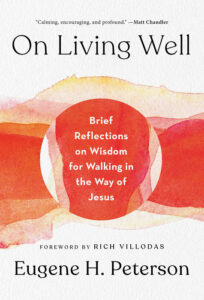 On Living Well: Brief Reflections on Wisdom for Walking in the Way of Jesus Eugene Peterson (Waterbrook) $20.00 OUR SALE PRICE = $16.00
On Living Well: Brief Reflections on Wisdom for Walking in the Way of Jesus Eugene Peterson (Waterbrook) $20.00 OUR SALE PRICE = $16.00
In a weekly Bible study I help lead I’ve been consulting The Message more than I used to and am again enjoying its helpfulness and clever creativity. Peterson’s love for words comes through, as always, not to mention his passion for getting the clear-headed point of Scripture made plain as day. As we have often said, we loved Eugene and Jan and respected them both immensely. I’ve read nearly all of his many books and often find myself going for them, I’ll admit, rather than The Message. But, man, could he turn a phrase, and I am trying, even now, to determine if I think he is different in his formal writing and his talks and his sermons and his Bible translations. There are a few different voices, I think — this becomes understandable, I suppose, when reading Winn Collier’s extraordinary A Burning in My Bones: The Authorized Biography of Eugene Peterson.(HERE is our early review of it; the 20% off BookNotes discount still stands.) He was a unique person, both country boy and urban scholar, small church pastor and significant professor, poet, jokester, preacher.
Well, On Living Well is yet another sort of genre, and I’m glad for this, very glad, It is, we might say, his “shorter writings.” Years ago Rich Mouw, when serving as President of Fuller Theological Seminary, published a little book of very short entries, drawn from what he called a rather unique genre— a collection of bits written from when he had been asked to make “brief remarks.” This really is tricky and can be thoroughly enticing when done well. On some days, Peterson was a man of few words, and he seemed to choose them carefully. Maybe the “brief remarks” or “shorter writings” genre is one that suited him well.
And, actually, these 200 entries in On Living Well are excerpted from the Amen! newsletter columns that Pastor Pete wrote when he served Christ Our King Presbyterian Church in Bel Air, MD, mostly in the 1970 and ‘80s. As the editor of this collection says about Peterson’s work in these pieces in the Amen! church newsletter:
It is a remarkable testament to his craft as a writer and his commitment to excellence in even the smallest opportunities.
“The wisdom in this book,” he avers, “represents Eugene at the height of his pastoral work, speaking with candor, warmth, and directness to those under his care.”
There are several major themes and the short pieces are grouped accordingly. It is a virtual handbook of living the Christian life, even if Peterson might not like the notion of a manual or checklist. But it does offer Biblically-shaped wisdom on a lot of topics. Wow.
Considered a “feast for the soul” this new volume contains never-before-published short pieces ranging from two pages to only a few paragraphs. While a couple are half a page in length, most are about one page. They can be read devotionally, they can be pondered and discussed, they could be read out loud as “opening remarks” before a meeting. That these have been compiled into topics and arranged around the theme of “living well” makes the short essays in On Living Well exceptionally useful. As always, it includes such about finding God in the down-to-earth, about living out the message of the Kingdom, of discovering an “extraordinary spirituality of ordinary life.” An ordinary life consecrated by living for and in Jesus. This is the sort of stuff you’d hear if you were in Peterson’s congregation in those years.
Here is the epigram in the front of the book, Peterson’s rendering of Proverbs 1:7 (from The Message) which maybe might invite you to take up this very book, on living well.
Start with God — the first step in learning is blowing down to God; only fools thumb their noses at such wisdom.
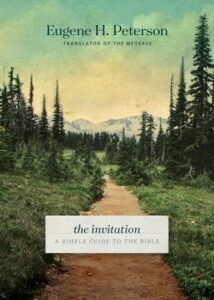 The Invitation: A Simple Guide to the Bible Eugene Peterson (NavPress) $12.99 OUR SALE PRICE = $10.39
The Invitation: A Simple Guide to the Bible Eugene Peterson (NavPress) $12.99 OUR SALE PRICE = $10.39
I have occasionally mentioned that I once wrote to Peterson, and maybe to a guy from NavPress — a key player in the adventure that led to the publishing of The Message lived near us here in Red Lion, PA — about how the introductions to each book of The Message (omitted from some editions, btw) are so very, very interesting and captures the key points of each book in their place within salvation history. I thought they’d make a great paperback to hand out, even to youth, as an accessible and even hip handbook. Why not take those well-written introductions and put ’em out in one small volume.
They publisher did just that, but as a boring looking hardback that was in those years a bit more expensive than I would have wished. The book went out of print for a decade or so.
And now, here it is again, in a very cool edition, a smallish paperback, at a great price. Hooray! The Invitation is exactly that: an invitation to study the Bible by giving you an inspiring overview, a book-by-book reflection on the point of it all.
I hope you, like me, have enjoyed and benefited from those helpful introductions before each book of the Bible. They are so spot on, engaging and informative and inspiring. I hope that you might want to see them in one nice volume, easy to consult, easy to read as a devotional, easy to give away. Why not use this book called The Invitation as an invitation. Buy a few at our sale price and give them out. It’s a gem. You can say your bookseller foisted it upon you. You’re welcome.
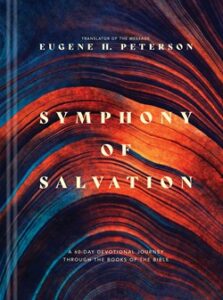 Symphony of Salvation: A 60-Day Devotional Journey Through the Books of the Bible Eugene Peterson (NavPress) $19.99 OUR SALE PRICE = $15.99
Symphony of Salvation: A 60-Day Devotional Journey Through the Books of the Bible Eugene Peterson (NavPress) $19.99 OUR SALE PRICE = $15.99
I don’t know if you’ve seen advertisements about this but if so, I’m sure you’ll agree that this looks just stunning. It has full color artwork, lots of nature photography that seems suited to the rugged stories of Scripture, with a contemporary typography and modern design layout. I like this book a lot, with its memory verses and pull quotes. It is colorful, handsome, sturdy, and would make a fabulous gift for a man or a woman, even a youth or a teenager.
Just know, though, that Symphony of Salvation is The Invitation (see above) arranged in a nicer way, with heavier, matte paper, illuminated with photography. It isn’t clear, I don’t think, that it is really nothing more than the same introductions to each book of the Bible that Peterson crafted so well for The Message and does not include any other new material. Once your expectations are no longer honed by the impression that this is something in addition to The Invitation, I think you’ll love Symphony of Salvation. I just wished they’d have called it The Invitation Deluxe Edition or A Simple Guide to the Bible from The Message: Full Color Version. Because that it is. It’s a feast for the eyes and a fine way to reflect on the gist of every book of the Bible, with a key verse highlighted. We recommend it heartily.
+++
TO PLACE AN ORDER
PLEASE READ THESE SIMPLY REMINDERS AND THEN CLICK ON THE “ORDER” LINK BELOW.
It is very helpful if you would tell us how you prefer us to ship your orders. The weight and destination of your package varies but you can use this as a thumbnail, general guide.
There are generally two kinds of US Mail options, and, of course, UPS. If necessary, we can do overnight and other expedited methods, too.
- United States Postal Service has the option called “Media Mail” which is cheapest but slow and may be delayed. For one book, usually, it’s about $3.49.
- United States Postal Service has another option called “Priority Mail” which is about $7.60 or so for a few books and that gets much more attention than does “Media Mail.”
- UPS Ground is more reliable but about $8.00 or more for one or two books to most places.
– DON’T FORGET TO LET US KNOW WHAT SHIPPING METHOD YOU PREFER –
HELPFUL HINT: If you want US Mail, please say which sort — Media Mail or Priority Mail — so we know how to serve you best. If you say “regular” we left scratching our noggins.
BookNotes
SPECIAL
DISCOUNT
20% OFF
ALL BOOKS MENTIONED
+++
order here
this takes you to the secure Hearts & Minds order form page
just tell us what you want to order
inquire here
if you have questions or need more information
just ask us what you want to know
Hearts & Minds 234 East Main Street Dallastown PA 17313
read@heartsandmindsbooks.com
717-246-3333
We are still closed for in-store browsing due to our commitment to public health and the common good (not to mention the safety of our staff and customers.) The vaccination rate here in York County is sadly lower than average and the positivity rate is going up. Our store is a bit cramped without top-notch ventilation so we are trying to be wise and faithful. Please, wherever you are, do your best to stop this awful sickness going around.
We are doing fun, outdoor, backyard customer service, our famous curb-side delivery, and can show any number of items to you if you call us from our back parking lot. We are eager to serve and grateful for your patience as we all work to mitigate the pandemic.
Of course, we’re happy to ship books anywhere. Just tell us how you want them sent.
We are here 10:00 – 6:00 Monday – Saturday; closed on Sunday. Thanks for your support.

